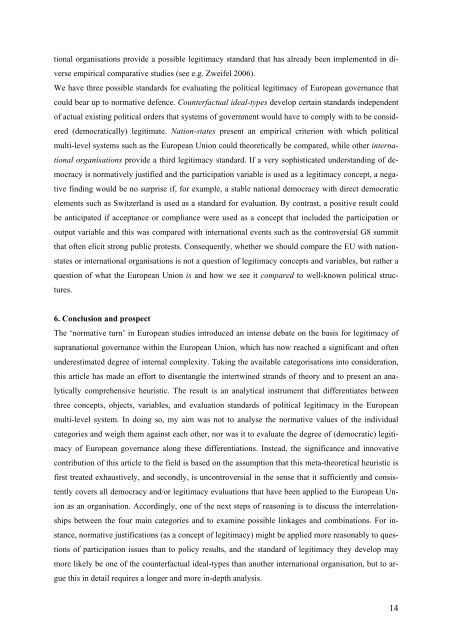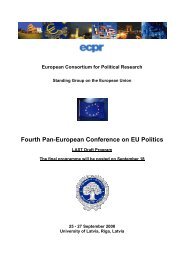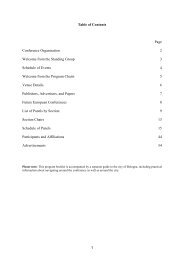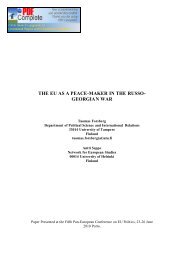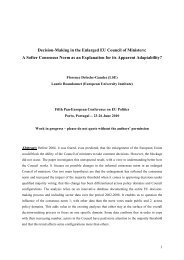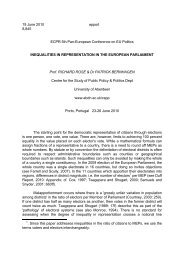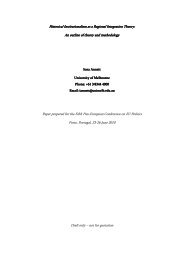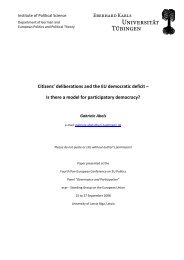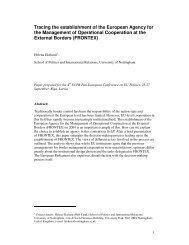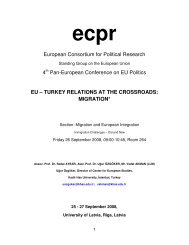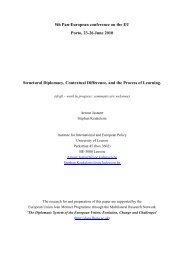Theorising the Democratic Legitimacy of European Governance
Theorising the Democratic Legitimacy of European Governance
Theorising the Democratic Legitimacy of European Governance
Create successful ePaper yourself
Turn your PDF publications into a flip-book with our unique Google optimized e-Paper software.
tional organisations provide a possible legitimacy standard that has already been implemented in di-<br />
verse empirical comparative studies (see e.g. Zweifel 2006).<br />
We have three possible standards for evaluating <strong>the</strong> political legitimacy <strong>of</strong> <strong>European</strong> governance that<br />
could bear up to normative defence. Counterfactual ideal-types develop certain standards independent<br />
<strong>of</strong> actual existing political orders that systems <strong>of</strong> government would have to comply with to be consid-<br />
ered (democratically) legitimate. Nation-states present an empirical criterion with which political<br />
multi-level systems such as <strong>the</strong> <strong>European</strong> Union could <strong>the</strong>oretically be compared, while o<strong>the</strong>r interna-<br />
tional organisations provide a third legitimacy standard. If a very sophisticated understanding <strong>of</strong> de-<br />
mocracy is normatively justified and <strong>the</strong> participation variable is used as a legitimacy concept, a negative<br />
finding would be no surprise if, for example, a stable national democracy with direct democratic<br />
elements such as Switzerland is used as a standard for evaluation. By contrast, a positive result could<br />
be anticipated if acceptance or compliance were used as a concept that included <strong>the</strong> participation or<br />
output variable and this was compared with international events such as <strong>the</strong> controversial G8 summit<br />
that <strong>of</strong>ten elicit strong public protests. Consequently, whe<strong>the</strong>r we should compare <strong>the</strong> EU with nationstates<br />
or international organisations is not a question <strong>of</strong> legitimacy concepts and variables, but ra<strong>the</strong>r a<br />
question <strong>of</strong> what <strong>the</strong> <strong>European</strong> Union is and how we see it compared to well-known political structures.<br />
6. Conclusion and prospect<br />
The ‘normative turn’ in <strong>European</strong> studies introduced an intense debate on <strong>the</strong> basis for legitimacy <strong>of</strong><br />
supranational governance within <strong>the</strong> <strong>European</strong> Union, which has now reached a significant and <strong>of</strong>ten<br />
underestimated degree <strong>of</strong> internal complexity. Taking <strong>the</strong> available categorisations into consideration,<br />
this article has made an effort to disentangle <strong>the</strong> intertwined strands <strong>of</strong> <strong>the</strong>ory and to present an analytically<br />
comprehensive heuristic. The result is an analytical instrument that differentiates between<br />
three concepts, objects, variables, and evaluation standards <strong>of</strong> political legitimacy in <strong>the</strong> <strong>European</strong><br />
multi-level system. In doing so, my aim was not to analyse <strong>the</strong> normative values <strong>of</strong> <strong>the</strong> individual<br />
categories and weigh <strong>the</strong>m against each o<strong>the</strong>r, nor was it to evaluate <strong>the</strong> degree <strong>of</strong> (democratic) legitimacy<br />
<strong>of</strong> <strong>European</strong> governance along <strong>the</strong>se differentiations. Instead, <strong>the</strong> significance and innovative<br />
contribution <strong>of</strong> this article to <strong>the</strong> field is based on <strong>the</strong> assumption that this meta-<strong>the</strong>oretical heuristic is<br />
first treated exhaustively, and secondly, is uncontroversial in <strong>the</strong> sense that it sufficiently and consistently<br />
covers all democracy and/or legitimacy evaluations that have been applied to <strong>the</strong> <strong>European</strong> Union<br />
as an organisation. Accordingly, one <strong>of</strong> <strong>the</strong> next steps <strong>of</strong> reasoning is to discuss <strong>the</strong> interrelationships<br />
between <strong>the</strong> four main categories and to examine possible linkages and combinations. For instance,<br />
normative justifications (as a concept <strong>of</strong> legitimacy) might be applied more reasonably to questions<br />
<strong>of</strong> participation issues than to policy results, and <strong>the</strong> standard <strong>of</strong> legitimacy <strong>the</strong>y develop may<br />
more likely be one <strong>of</strong> <strong>the</strong> counterfactual ideal-types than ano<strong>the</strong>r international organisation, but to argue<br />
this in detail requires a longer and more in-depth analysis.<br />
14


